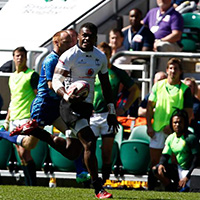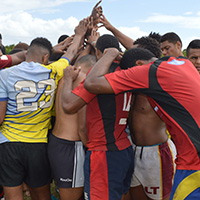Comprehensive and innovative medical standards set for Rugby World Cup 2019.
Rugby World Cup 2019 will feature the most comprehensive player welfare standards ever implemented for a rugby event after World Rugby announced an expansion of its package of mandatory requirements for elite competitions worldwide.
The tournament player welfare standards programme is a set of mandatory medical standards that elite competition owners and participating teams have to comply with in order to operate the temporary substitution process for Head Injury Assessment (HIA) – debuted at Rugby World Cup 2015. Since then it has been rolled out across 22 elite competitions worldwide.
With World Rugby committed to the highest-standards of player welfare in the sport, the standards are designed to ensure consistency in the identification, management and prevention of injuries.
The programme has proven successful in identifying and permanently removing players with confirmed and suspected concussion, while also playing an instrumental role in changing culture and behaviour towards concussion.
Less than six per cent of concussed players are now incorrectly left on the field of play compared to 56 per cent in 2012. World Rugby is committed to further reduction with the addition of four new components to the package of 10 mandatory elite rugby standards to create a new Premium Standards for Elite Competitions.
The new components are also designed to enhance uniformed data collection and advance World Rugby’s evidence-based approach to injury-management. They are:
• Mandatory uniformed injury surveillance programmes compliant with the World Rugby consensus statement
• Mandatory presence of a World Rugby standard Match Day Doctor in addition to team medics at every match
• Mandatory video review technology functionality to assist with the identification and management of head injuries
• Mandatory presence of a World Rugby representative on the HIA review process.
• These standards are applicable to World Rugby sanctioned events including; Rugby World Cup, Women’s Rugby World Cup, the 6 Nations, The Rugby Championship, Super Rugby, EPCR Champions Cup and elite domestic club rugby competitions.
The new requirement for detailed annual injury surveillance to be undertaken and shared with World Rugby will enable one truly global and consistent annual audit to further inform injury-prevention.
To assist with the process, World Rugby has developed a dedicated injury surveillance App, which it is providing to all competitions.
The premium standards build on the core player welfare standards programme, which is available for semi-elite competitions, while competitions not approved for HIA process, including the community game, will use Recognize and Remove where teams undertake concussion education and guidance and are encouraged to download World Rugby’s dedicated concussion education App.
World Rugby Chairman Sir Bill Beaumont said: “World Rugby, in partnership with its unions and regions, is committed to driving gold standard medical and player welfare standards in sport and an evidence-based approach to injury prevention at the elite level.
“Rugby World Cup 2015 raised the bar with the introduction of detailed mandatory standards that included independent concussion consultants, video review to identify potential head injuries, independent match day doctors and accreditation of medics. These standards were subsequently rolled-out across the game and are underpinning enhanced concussion prevention, identification, and management, resulting in concussion incidence dropping.
World Rugby Chief Medical Officer Dr Martin Raftery added: “With a focus on injury prevention, we have now enhanced the package of mandatory standards ahead of Rugby World Cup 2019 to ensure that all competitions are capturing like-for-like injury data, have dedicated match day doctors and video review for medical purposes. We have the full support of unions and competitions and would like to thank them for their commitment.”
Alongside increases in concussion awareness, education and protocol compliance, the HIA process has also played a central role in the reduction of concussion rates in elite rugby.






